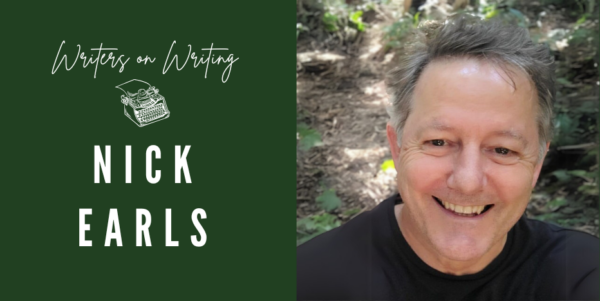
Writers on Writing is our regular conversation with a writer or industry professional about the writing craft, industry insights, and their own practice. This week, we spoke to Nick Earls about writing short stories and his creative practice.
You’ve written an array of both short and longer-form fiction (28 books and counting!). How can you tell when an idea is more suited to a short story?
If you think the value of an idea is best realised by glimpsing it rather than staring at it for 80,000 words, maybe it needs to be a short story. Sometimes as a writer you need to keep your pencil sharp. Some ideas are best delivered contained, rather than developed into more. If a great short story idea might be lost in a novel, don’t try to novelise it. Let it be what it needs to be, then try to find a home for it once you know what it is and how big it is. A novel is an opportunity to do multiple pieces of business. A short story is the perfect opportunity to do one piece of business in a fresh way really well.
Who are your favourite short story authors?
Here’s a selection, in no particular order:
Tara June Winch: The Yield (a large and complex novel) was a deserved winner of the Miles Franklin, but don’t go past After the Carnage, the short story collection that preceded it. Truly artful literary writing. Tara June Winch always know exactly where to stand when she’s about to shine a light on something. And her ability to adapt to a broad range of central characters is impressive.
Elizabeth Tan: Smart Ovens for Lonely People shows what happens when you take the brakes off a huge imagination, and somehow match it with the talent to drive it.
Julie Koh: Portable Curiosities shows an impressive ability to take the absurd, make it compelling and make it somehow say something about everyday life.
Laura Elvery: I love Laura Elvery’s use of detail and focus on her characters. She also picks her characters and picks her moment really well. And brings impressive writing craft. And best of all, she keeps these skills operating in the background (as we all should), letting the reader connect with the characters, so there’s a lot to feel as well.
What does your own creative practice look like? Are you a plotter or a pantser?
Oh, plotter, no question. But that’s what puts me in a good position to pass some of my tools on in workshops. I’ve spent decades working out what I’m doing and how I can do it better, turning instincts and chance developments into tools I can recognise, control and use when I need to. So a lot goes on behind the scenes before I start drafting. Not that I think that’s the only way to write – okay, secretly I do, but I’m aware that pantsers have turned out some great books, however that happens – but it leads to me staring into the distance a lot less and gives me a process that develops and delivers a story.
Lastly, anything you’ve read lately and enjoyed?
I’ve just finished Clare Keegan’s So Late in the Day, which is a slim hardback made up of three longish short stories. (We could have a debate about whether or not they’re novellas, but let’s not.) Each story has its own cast of two characters, one male and one female (the book carries the subtitle ‘stories of women and men’). All six characters are distinct and, now that I’ve finished soaking it all up, I can appreciate the craft that went into making each of them, and making each pair collide in a fascinating way. Like much of the best writing, the craft is only evident afterwards. It’s that careful thought about the characters that gives it its power, I think, and allows the relationships to evolve in the way they do.
Nick Earls is the author of 28 books for adults, teenagers and children. His writing has won awards in Australia, the UK and US, and appeared on bestseller lists in those countries. His Wisdom Tree novella series received gold medals in the Independent Publisher Book Awards (US) and the eLit Awards (US), as well as winning the People’s Choice Award at the NSW Premier’s Literary Awards. His PhD thesis comprised the Wisdom Tree novellas and research on contemporary novella craft and publishing.
Join Nick’s six-week course, Online: Short Stories starting on Monday 24 February. Enrol here >>
If you want to be the first to read great advice, prompts and inspiration from our incredible tutors, subscribe to our weekly e-newsletter Newsbite.
More from Writing NSW
Check out our full range of writing courses in Sydney, our online writing courses and our feedback programs to see how we can help you on your creative writing journey. Find out about our prizes and opportunities, as well as writing groups across NSW, and sign up to our weekly newsletter for writing events, opportunities and giveaways.

